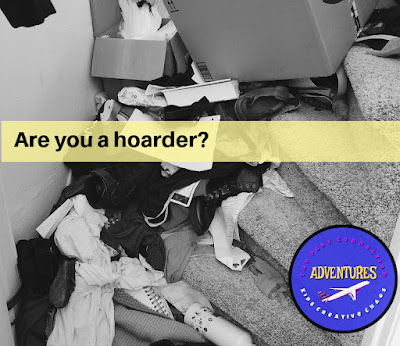Can't We All Just Get Along?
The last few articles have been on the subject of mental health and the breakup of the family unit. As the family situation changes, so do the matters of family concern. Of course, how you deal with these changes affect the future mental health of your children, but don’t forget to take care of yourself. As mentioned in a previous article, “If mama ain’t happy, ain’t nobody happy.” My advice is this, self-care is a key element to a happy, healthy family, but be careful, don't over do it.
This post contains Amazon and other affiliate links.
If you’ve come off a long-term, unhealthy relationship, chances are you’ve been neglecting self-care. Self-care is key to your happiness. Newly separated or divorced individuals might choose to jump out into the dating scene. At first, it's exciting and new. If you've been in a bad situation, going out on dates and having fun can feel like self-care, but you need to be careful that all that good time fun having doesn’t lead to an even more unhealthy rebound relationship. Just like our children, we need to make healthy choices.
Practice being alone. I can’t emphasize this enough. Spend time alone. As much time as it takes for you to get over the pain. And as much time as you need to grow as a person. Learn from your mistakes and take care of yourself. As I age, I see intelligent women jumping into relationships. Perhaps, they’ve been a stay-at-home mom. Maybe they’ve never held a full-time job. Some never had the chance to go to college. They’ve never managed their own finances. Often, they feel like they just can’t handle the responsibilities of taking care of themselves and their children. So, they go out on a man hunt. The goal is to find a better man than the last one. Some are looking for a man to meet their financial expectations, others are looking for companionship, and some are looking for a father figure for their children. Whatever the reason, they jump into a relationship too soon. Been there done that.
Healthy Family
I got married while still in college. It was okay. Just okay. I wanted to be happy, but we were young and a lot was missing in the relationship. At that point in my life, the idea of a wedding was more important than the idea of a marriage. We were friends and companions struggling to find common ground, but something was always missing. Both of us had placed our focus on gaining knowledge and prepping for a career and little attention was given to intimacy. As starving college students, there was no money for fun things and then we jumped into buying a house, and then another house, and then it all just got way too overwhelming. There was simply no fun to be had.
Eventually, we talked to friends, family, and clergy. We attended counseling. It all pointed to the same thing, we just didn’t have the same goals or the same outlook on life. We ended the relationship in an amicable fashion. And that’s when my real troubles started. I briefly dated, but playing the field has never been my thing. Dating in your late 20’s is an experience that I wouldn’t wish on anyone. Ugh. It’s a brave new world. With my thirtieth birthday looming over my head, I really wanted to settle down and start a family before it was too late. I had some great men to choose from, two were truly amazing with interesting careers. One was neither amazing, nor did he have a great career. He was lucky to hold down a job. But he had what I wanted. A little girl. My family doctor and the counselor both advised against any serious relationship or even dating after the first year of a breakup, but my biological clock was ticking. Tick tock. Having been told I likely could never have children, I jumped at the chance.
However, that wasn’t the only thing. He was fun. Oh so fun! He loved to dance, hike, bike, play sports, cook, and clean. One day, he called me one of the “cools.” I had been feeling lost. I was never cool. I wanted to do all those things I felt I’d missed out on in high school and college. Except I didn’t. I was still that goody two shoes inside. His risky lifestyle stressed me out. We fought. Among other things, he drank. He was verbally, emotionally, and physically abusive. It was like a dark movie from one of those cable tv channels for women. That was my first rebound.
After that, I wasn’t sure I was going to be able to pick myself up again. I had a lot of counseling. I saw a psychiatrist. I took various medications. Was I suicidal? Not really, but it seemed like life had gotten the best of me. I felt like a failure in every way imaginable. No kids, no career to speak of, and no real chance to recover from all the despair because, in my head, I was old. Oh, so old. I turned to online dating. It was uplifting to have so many men interested in dating me. It was also terrifying. That was the start of rebound number two. Not only did I not wait a year to date, in only a few short months I had moved in with a man and was pregnant. At the time, it seemed like he had everything I wanted. A good job, two kids, pets, a nice home. He was a widower and that (like the alcoholism before him) fulfilled my need for codependency. I had something to do, people to take care of, and dreams to fulfill. Except, we were less compatible than the previous rebound relationship. Shortly after my son was born, I became pregnant again.
Things weren’t ideal, but I always questioned myself. Why not? Maybe I was the problem. I should’ve been content. I was determined to make it work. I mean, after all, he wasn’t abusing me. He yelled a lot. It triggered old feelings from the previous relationship. I cried a lot. It made him mad. I cried more. It was an endless cycle. We barely knew each other. We met online. We were both lonely. As it came to be that he was my only friend for many years, we were really never friends. We both tried. The harder I tried, the more difficult it got. And now, there were kids involved. I didn’t want to break up the family unit. I didn’t want my kids to come from a broken home. Ugh, the damage I did to all of us by trying to stick this one out. We were the absolute opposite of compatible. I will spare you the gory details.
I had so many health issues. I spent months in bed, with nothing more to do than reflect on my past. I knew it had to end. But I was scared. Could I do it alone? Was I strong enough? I started stepping up my game, working harder from home, seeing various specialists and improving my health, and building credit. Once I knew what had to be done, I still wasn’t ready to do it. Things finally worked out in a way that made ending the relationship the most logical decision. It was difficult, but I didn’t need to seek counseling. I threw myself into my work, my writing, and the remodeling of my new house.
After years of thinking about it, deep down, I knew if I were ever to have another relationship again, I’d have to be strong. I’d have to take care of myself first, I’d need a break. I wrote down the pros and cons of dating. Months passed. I thought about what I wanted. What I needed, who I wanted and why. I realized I didn’t need a man to be happy. But I wanted that companionship that had eluded me for most of my life.
Why it's okay to Need a Man
It was always the same set of traits that had always led me to the same conclusion. But, I didn’t want to make the wrong choice with the right choice. So, naively, I attempted to play the field again, but I didn’t date. I just talked. I talked to several old friends and acquaintances. This time no online dating, no strangers. I weaned them all out. I settled on one for an attempt at dating. We talked for weeks before meeting in person. I knew him from high school. He seemed to fit the criteria. But low and behold, it was a mistake. A big mistake, but one I wanted to cling to because I was sad and lonely. I had basically given up. I was about to turn fifty. There was no more time for mistakes. If I thought dating in my late twenties was hard - whoa. In your fifties, it’s a whole new frontier. Casual dating wasn’t an option for me.
I took a few weeks to get myself together. I pulled out my list again, and this time, I realized what I always needed had always been there. Sometimes, you just need a friend.
Recommended:
What is Sepsis?
Affordable Counseling Online
Sensory Processing Issues























